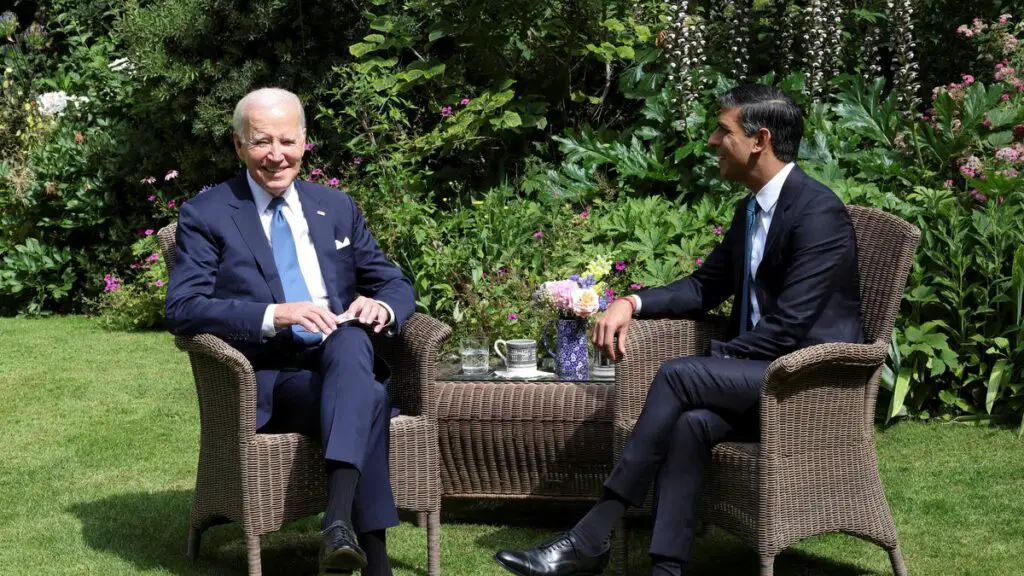Leaders of G7 Nations Express Support for Israel’s Right to Self-Defense.
British Prime Minister Rishi Sunak recently met with U.S. President Joe Biden to discuss the ongoing conflict between Israel and the Palestinian militant group Hamas. As a result of their conversation, leaders of the G7 nations, which include the U.S., U.K., France, Canada, and Italy, affirmed their support for Israel’s right to defend itself against terrorism while also calling upon the Jewish state to uphold international humanitarian laws and protect civilians.
The Joint Statement
Following President Biden’s call with Canadian Prime Minister Justin Trudeau, French President Emmanuel Macron, German Chancellor Olaf Scholz, Italian Prime Minister Giorgia Meloni, and British Prime Minister Rishi Sunak, a joint statement was released by the White House on Sunday. The statement emphasized the leaders’ support for Israel’s right to self-defense and their commitment to adherence to international humanitarian law, including the protection of civilians.
The Background
The latest escalation of the conflict between Israel and Hamas was triggered by unprecedented attacks launched by Hamas militants on October 7th. In response, Israel launched a massive counter-offensive against the Islamic militant group, which has ruled the Gaza Strip since 2007.
Calls for Immediate Release of Hostages
The leaders expressed their relief at the release of two American hostages, a mother and her teenage daughter, and called for the immediate release of all remaining hostages. They pledged to work together closely to provide support to their nationals in the region, with a particular focus on assisting those who wish to leave Gaza.
Humanitarian Aid and Assistance
The leaders also welcomed the announcement of the first humanitarian convoys reaching Palestinians in Gaza. They committed to continued coordination with regional partners to ensure sustained and safe access to essential resources such as food, water, and medical care. The goal is to meet the humanitarian needs of the people in Gaza who have been affected by the conflict.
Diplomatic Efforts and Long-Term Solutions
In addition to immediate actions, the leaders reiterated their commitment to close diplomatic coordination with key partners in the region. Their objective is to prevent the conflict from spreading, preserve stability in the Middle East, and work towards a political solution that will result in lasting peace.
President Biden’s Conversations
Earlier on the same day, President Biden engaged in a discussion with Israel’s Prime Minister Benjamin Netanyahu to address the developments in Gaza and the surrounding region. During the call, President Biden expressed his appreciation for the entry of two convoys of humanitarian assistance into Gaza, marking the first such aid deliveries since the conflict began. Both leaders emphasized the importance of maintaining a continuous flow of critical assistance to Gaza.
Efforts to Secure the Release of Hostages
The safety and well-being of the remaining hostages, including U.S. citizens, were among the topics covered in the leaders’ discussions. Efforts to secure their release and facilitate safe passage for U.S. citizens and other civilians in Gaza who wish to depart were emphasized.
Updates from the National Security Team
In order to stay informed on the latest developments in Israel and Gaza, President Biden and Vice President Kamala Harris received a briefing on Sunday from their national security team. The meeting was attended by Secretary of State Antony Blinken, Defense Secretary Lloyd Austin, National Security Advisor Jake Sullivan, and other relevant officials.
As the situation in the Middle East continues to unfold, the G7 nations are united in their support for Israel and their commitment to finding a peaceful and lasting resolution to the conflict. Through diplomacy, coordination, and the delivery of humanitarian aid, they aim to preserve stability in the region and work towards building a future of peace.

